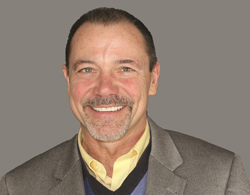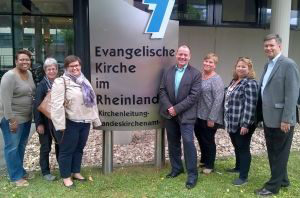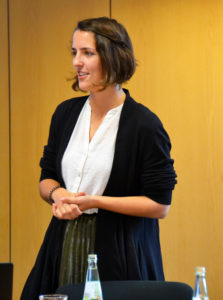From the President, September 2017

Michael J. Readinger
As an unhealthy (in my world view) focus on nationalism has gained its hold on our nation politically, I am reminded how much we stand to gain by expanding our understanding of the practices and policies of our international peers and allies. Recent natural disaster activity reminds me of the importance of caring for our neighbors here and abroad.
Now that our CHHSM delegation to visit the German Diakonie Rhienland-Westfalen-Lippe has returned to the USA, I am reflecting on our many similarities and differences. We both face increasing challenges as the number of people we are called to serve increases daily. The need for affordable housing in Germany is as critical as it is here in America. The movement to care for the aging population in their homes is also a top priority. This is causing Diakonie to search for new ways to serve elderly adults through adult day care centers and home health care. Additionally, the aging population moves to assisted living and skilled nursing communities at a later stage in life. As a result, the percentage of residents served that have dementia is upwards of 70 percent when they come into care. Innovations in care for troubled children, families and youth, and people with developmental disabilities, are also important as Diakonie RWL seeks to meet their increasing needs and remain competitive. In fact, all Diakonie ministries, especially hospitals, are facing both an increase in competition from for profit entities and a push from the government that is in favor of paying those secular institutions to do this important work.

The CHHSM delegation arrives at Evangelical Church of Germany offices in Düsseldorf.
In our many ministry visits, I remarked time and again that if you took down all the signs printed in German, you would not be able to tell the difference between their communities and ours in the United States.
The method of reimbursement and the manner in which we pay taxes and support our ministries is very different. There is a “church tax” that German workers pay, which supports both the churches or parishes where they worship but also the Diakonie ministries. A small portion of this tax funds the work of the Diakonie, with the balance coming from the social welfare system that exists in Germany. Despite these two sources, our Diakonie partners often find that services are unreimbursed at a rate similar to here in the USA (about 15 percent). Our CHHSM ministries have a long history of fundraising from churches, corporations, foundations and individuals, but the Diakonie is just beginning to learn how to do this. We were privileged to offer a three-hour workshop on methods for fundraising, best practices and practical success stories that we have used.

Susanna Thiel discusses Diakonie RWL’s commitment and call to ministering with refugees.
The most striking example of the differences between our two ministries is the German response to the support and integration of refugees and immigrants. They see this as an important and increasing call to serve those in need. Their programs for advocacy, counseling, financial and workforce support are an incredible example for our CHHSM ministries and our government.
The Diakonie in Germany is seen as the Church. This is codified in law because they “spread the Gospel” (of Jesus’ healing word) and they “provide the meal” as described in Matthew 25. The difference in the people’s perception of the German Church’s diakonical work compared to here in the USA is significant. It is expected and appreciated in a much deeper way than here. Of course, they are also facing the challenge of decreasing numbers of church members and the secularization of society that we face. Surprisingly, there are not many chaplains employed in their ministries. This function is filled with a theological member of the leadership team.
Because their work is funded by the government in a direct fashion, the relationship with politicians is very different than in the United States. It is more of a partnership, and advocacy in Germany is more like advising and much less like the lobbying found in the USA. It is also unique that politicians quite often serve on Church and Diakonie boards. When it comes to health and social services, there is no need to separate church and state as in the USA.
All that I saw and learned in Germany reminded me of the importance of caring for our neighbors. We arrived right after Harvey and returned right after Irma. While we were away, a devastating earthquake hit Mexico and typhoons ravaged south Asia, creating many displaced people. The need in the world is great and we cannot ignore our moral and theological obligation to assist others. Nor should we decline the offer of help from other nations when we have the need. With all these natural disasters hitting in succession, let’s not forget those who are suffering from oppression and genocide as they are forced into the hopeless cycle of living life in exile. There has been so much talk of tragedy and suffering from Harvey, Irma, earthquakes and typhoons that I find myself forgetting the plight of Syrians, Palestinians and so many others. In fact, I do not know any of those who were affected, but I have been impacted by their stories of struggle and survival. I have been moved to action in our call to respond. I have found myself praying thoughts of healing and peace.
Please remember. We are not an island and we do not know everything or have all the answers. Look around. Listen. Learn. Care. Wouldn’t you want others to do the same?
Join Our Mailing LIst
"*" indicates required fields
Follow on Facebook
Hoyleton’s ‘Be the Light’ Honors Volunteers, Raises $94,000 for Programming - CHHSM
www.chhsm.org
Hoyleton (Ill.) Youth and Family Services lit up the room Feb. 28 during its 42nd Annual Hoyleton Honors celebration. With the theme of “Be the Light,” Hoyleton highlighted the numerous ways the o...